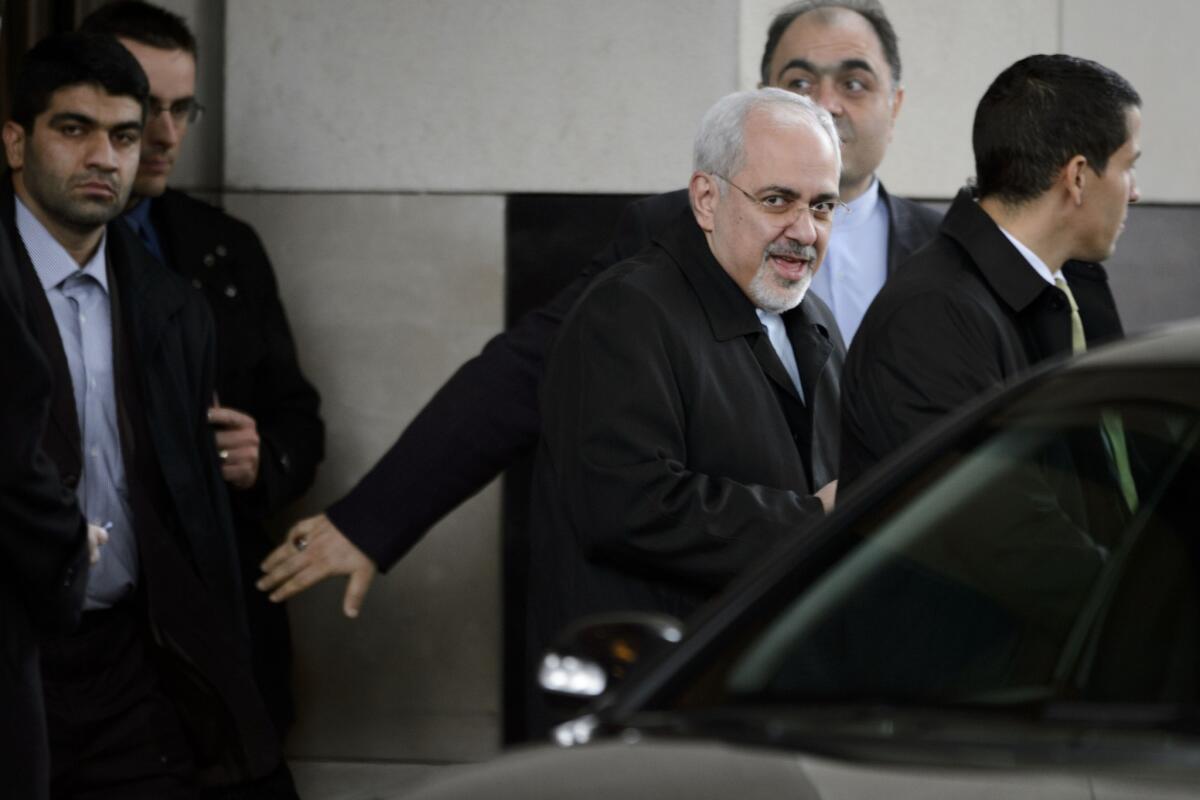Nuclear talks resume between Iran, six world powers

- Share via
GENEVA -- International negotiations over Iran’s nuclear program resumed here Wednesday, with the U.S. team under growing pressure to deliver an interim deal as soon as possible.
Ten days after the last round broke off just short of the finish line, the Americans joined representatives of five other world powers and Iran in talks that are scheduled to run at least through Friday.
The six world powers met among themselves Wednesday morning, and were scheduled to meet with the Iranian team later Wednesday or Thursday following a lunch between Iranian Foreign Minister Mohammad Javad Zarif and European Union foreign affairs chief Catherine Ashton, who is the point person for the world powers.
Zarif, Russian and Chinese officials all voiced optimism this week that an opening deal is close at hand, while U.S. officials were more cautious, perhaps trying to avoid dire reviews if this week’s bargaining again falls short. “I don’t know if we’ll be able to close a deal this week or next week,” President Obama said in comments at an event sponsored by the Wall Street Journal.
But though U.S. officials insist that they do not feel pressure to quickly deliver a deal, another inconclusive meeting could provide an opening for the many foes of the potential agreement, who are circling impatiently.
Israeli Prime Minister Benjamin Netanyahu, fresh from lobbying Congress to block the unfinished diplomatic product he calls a “bad deal,” arrived in Moscow with the same message for Russian officials.
Democrats in the Senate have apparently succeeded in delaying for at least two weeks a vote to impose additional sanctions on Iran, following White House warnings that the move could sink diplomacy and start a “march to war.” But some senators have prepared a sanctions amendment to the annual defense authorization bill, which is to come up for consideration in December.
The six powers -- Britain, China, France, Germany, Russia and the United States -- are preparing a deal that offers Iran limited relief from international sanctions crippling its economy in return for limits on its nuclear program. Many countries fear Iran is seeking a nuclear weapons capability, despite its denials.
This first-phase deal would provide time for the two sides to negotiate a final comprehensive agreement while easing the risk that Iran would secretly forge ahead with the nuclear program during the six months to a year it would probably take the reach that final bargain.
The last round of talks revealed some differences between members of the six-nation group. U.S. officials maintain that the differences were minor, but diplomats from some other countries say they were substantial, and could reappear as the talks get close to completion.
All agree that Iran had major problems with the last draft. One diplomat speculated that Iranian negotiators, who left Geneva on Nov. 11 looking for guidance from Tehran, may return to Geneva with a counter-proposal on some key points.
Signals from Iran have been mixed.
Zarif has been declaring his faith that a deal may be close, and emphasizing that the world has a “historic opportunity.” But the man he reports to, Iran’s supreme leader, Ayatollah Ali Khamenei, spoke to the hard-line Basiji militia Wednesday in terms suggesting that he will never soften his opposition to the United States.
Though Khamenei insisted at one point that he is not unalterably opposed to cooperation with the Americans, he also blasted the U.S. for slavery, mistreatment of Native Americans, the dropping of two nuclear bombs on Japan in 1945 and what he said was brutal treatment of other nations.
The doctrine of “heroic flexibility” that he recommended to Iran’s negotiators “means artistic maneuver to reach the goal,” he told the group, adding that he didn’t approve of yielding “one iota” on Iran’s positions in the talks.
ALSO:
U.S. Ambassador to China Gary Locke to resign
Obama asks Senate leaders to hold off on new Iran sanctions
Mexican cartels abet heroin and meth surge in U.S., DEA study says
Twitter: @richtpau
Times staff writer Richter reported from Geneva and special correspondent Mostaghim from Tehran.
More to Read
Sign up for Essential California
The most important California stories and recommendations in your inbox every morning.
You may occasionally receive promotional content from the Los Angeles Times.











